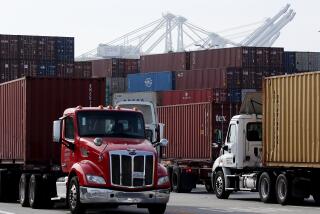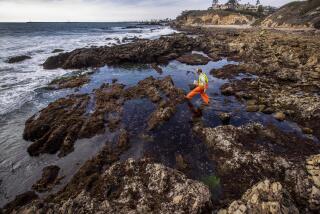Drop in U.S. Oil Spills Tied to Tough Laws : Environment: Reports show the federal action in the aftermath of the Exxon Valdez incident has led to improvement in the safety of chartered tankers.
- Share via
Tougher federal laws and heightened caution by oil shippers since the 1989 Exxon Valdez disaster have dramatically reduced major oil spills and brought safer tankers into U.S. waters.
The apparent trend--documented by industry experts and in several recent reports, including one released Friday--could mean a long-term reduction in the amount of oil spilled along the nation’s sensitive coastlines.
Only three major spills occurred in 1991, and there have been none so far this year, according to a study released Friday by international oil-spill expert Richard Golob. Only 55,000 gallons were spilled in 1991, which Golob called “rather astounding.” In contrast, when the Exxon Valdez grounded in Alaska’s Prince William Sound, 10.8 million gallons were spilled.
Although he warns that it is too early to draw long-term conclusions from the surprising drop in spills, Golob’s findings are mirrored in other recent studies--as well as the experience of many environmentalists, Coast Guard regulators and industry observers.
“Whatever it indicates, it’s good news for the environment,” said Golob, president of Cambridge, Mass.-headquartered World Information Systems, which publishes Golob’s Oil Pollution Bulletin.
Indeed, another shipping watchdog, the Tanker Advisory Center--which since 1974 has published annual ratings of the condition of the world’s 3,500 tankers--has found a small but noticeable improvement in the safety of chartered tankers entering U.S. waters since enactment of the Oil Pollution Act of 1990, passed in the aftermath of the Alaska spill.
The New York-based center rates a tanker’s condition on a scale of 1 to 5--with 5 being the safest. Tankers in U.S. waters averaged 3.4 on this scale the month before the Alaska spill. By March of this year, this had improved to 3.6.
“I think it’s just a general fear of the consequences of an oil spill,” said center director Arthur McKenzie, a veteran of 40 years on Exxon Corp. tankers.
“An owner trying to limit his liability says, ‘Well, I’ll just try to pick better ships,’ ” McKenzie explained.
In a separate report issued earlier, the Petroleum Industry Research Foundation has also found improved tanker operations since the new law took effect. “The most visible effect of (the law) so far is the sea change in operational procedures, safety provisions and inspection routines now being implemented in the oil trades,” concludes the report. “The trend is pervasive, across all company types and all company sizes.”
Aimed at an across-the-board tightening of tanker safety, the Oil Pollution Act of 1990 focused on:
* Increasing spillers’ liability over previous federal limits--in the case of big tankers to as much as $200 million. Under the act, states are allowed to hold companies liable for unlimited amounts. Shippers are also required to clean up spills and fund $1 billion worth of oil-spill response equipment, as well as proving financial responsibility before entering U.S. waters.
* Improving training and tightening sanctions against ship operators involved in spills.
* Requiring that double-hulled oil tankers be phased in for use in U.S. waters between 1995 and 2015.
At the time, the petroleum industry expressed deep reservations about the law’s high liability provisions. The big oil companies, Golob recalled, “thought that no major transportation companies would enter U.S. waters, because they might lose their company in damage claims if there were a major accident.”
Industry experts predicted that small shippers would be tempted to use the cheapest and least safe charter tankers available, abandoning them in the case of a big spill and allowing dummy corporate owners to go bankrupt.
“The rust-bucket hypothesis has proved invalid, it has not happened,” Golob said Friday.
But environmentalists caution that the dramatic improvement could be short-lived, as the huge expense of the Exxon Valdez spill fades into memory. The Coast Guard is continuing to develop regulations required under the 1990 act, and environmentalists are calling for continuing vigilance in the process.
“It’s so crucial that the rule-making the Coast Guard is doing now is enacted with strong preventive provisions,” said Nina Sankovitch, senior project attorney with Natural Resources Defense Council, an environmental activist group.
Sankovitch and others want stronger outer hulls and more space between the double hulls than the Coast Guard is contemplating, as well as other tightened regulations. Still, she agrees that the apparent improvements are real.
“The charter vessels that are coming into the country are better than they were,” Sankovitch said.
Meanwhile, research by the state of Alaska has found that the safer double-hulled tankers, soon to be required under a federal deadline for all traffic in Prince William Sound, can be cost-beneficial to the oil companies.
As part of a general refurbishment, an older single-hulled vessel can be overhauled and given a double hull--with no loss of oil-carrying capacity--for about 36% of the tanker’s original cost, according to the Alaska Department of Revenue. And this extends the life of the ship by as much as 15 years. Considering current oil-spill cleanup costs, this turns out to be an attractive investment.
Only five double-hulled tankers are currently in use in the United States, carrying refined fuels for the Navy’s Military Sealift Command. Although several of the tankers have grounded, none have leaked.
Oil and Water
Oil spills from tankers have been dramatically reduced, particularly in the past two years. And the amount of oil spilled in 1991, the most recent full year reviewed, was the lowest in 14 years. Here are the number of spills of 10,000 gallons or more:
Year Spills 1992 0 1991 3 1990 7 1989 5 1988 5 1987 4 1986 7 1985 3 1984 10 1983 3 1982 2 1981 8 1980 10 1979 16 1978 5
Source: Golob’s Oil Pollution Bulletin
More to Read
Sign up for Essential California
The most important California stories and recommendations in your inbox every morning.
You may occasionally receive promotional content from the Los Angeles Times.













